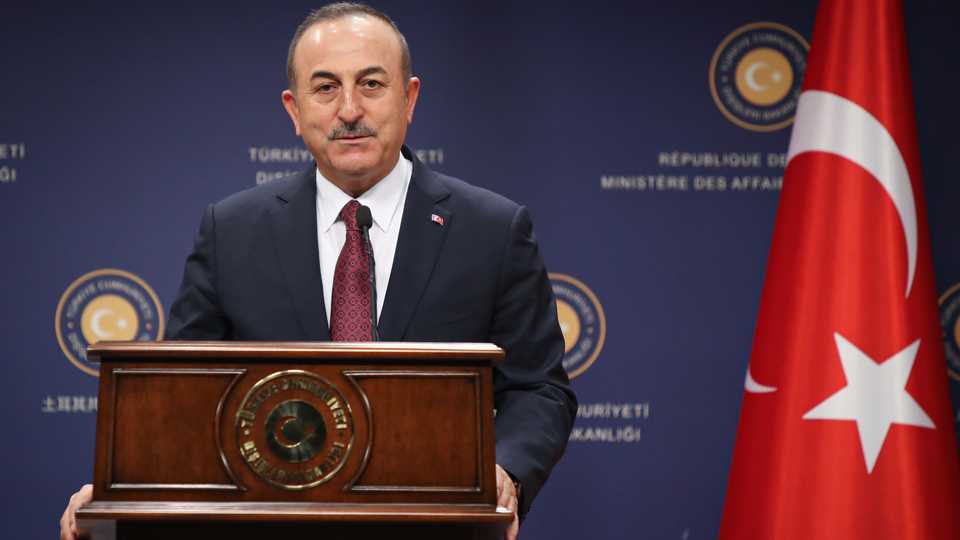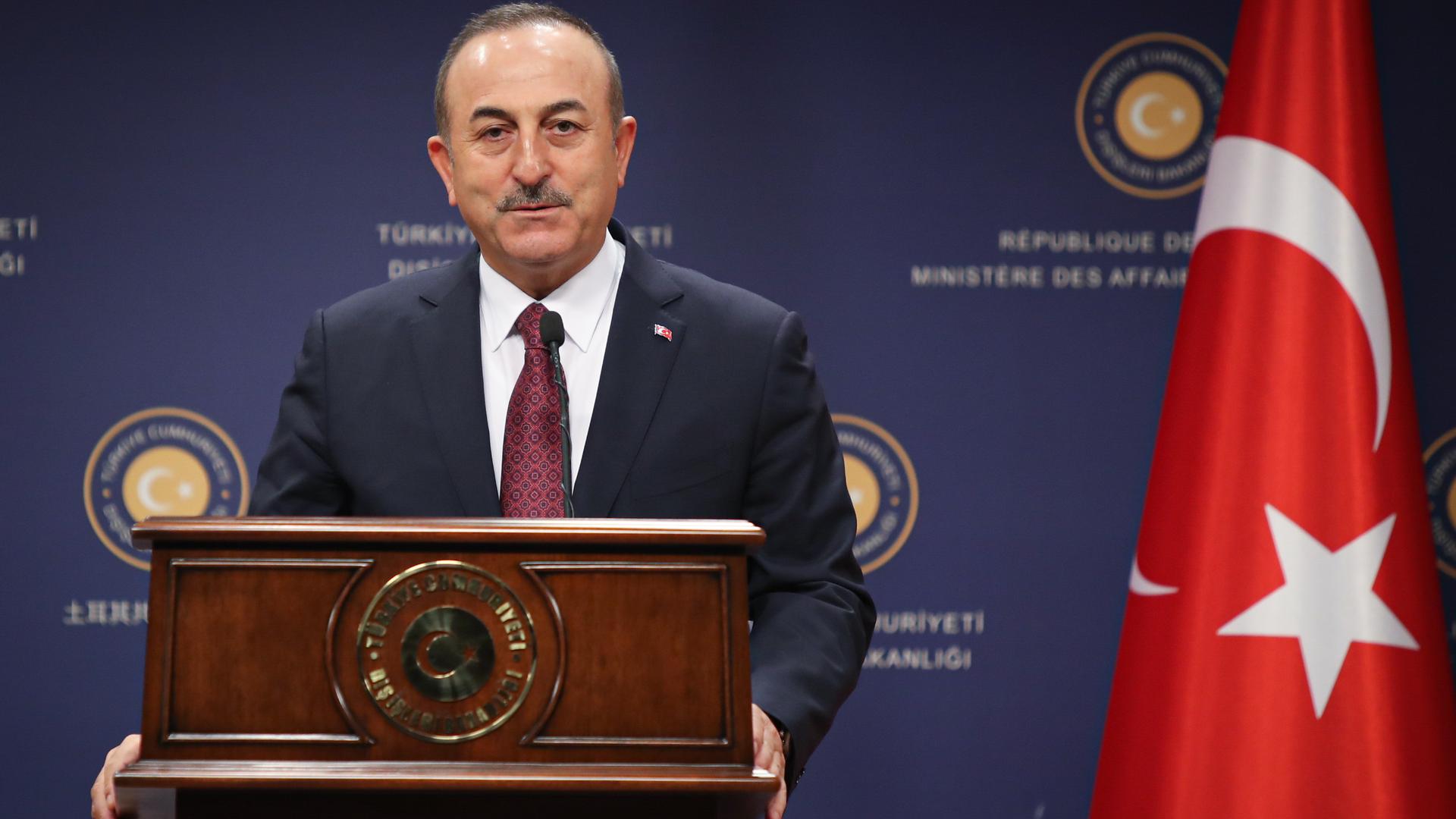
In an interview with local Turkish broadcaster A Haber, the Turkish Foreign Minister Mevlut Cavusoglu hinted at the US Congress that Turkey could shut down the Incirlik Air Base and Kurecik Radar Station in response to potential US sanctions.
“The US Congress members should understand that they cannot achieve anything by imposition,” Cavusoglu said.
It was the first time that Incirlik or Kurecik have been raised publicly since the previous closure of the Incirlik Air Base in 1975 when Washington looked to impose sanctions to limit the Turkish army’s use of US-manufactured weaponry, implementing an arms embargo, and freezing aid in response to Turkey’s operation to protect Cypriot Turks from ethnic cleansing.
Ankara responded in 1975 by limiting US use of Incirlik Air Base to NATO-related operations only.
Recently, Turkey refused demands from US leaders not activate the Russian S-400 system in order to avoid possible US sanctions.
Cavusoglu reminded the US that Turkey is a partner in the F-35 fifth-generation joint strike fighter programme, and the jets do not interfere with Russia’s S-400 air defence system.
The US proceeded to remove Turkey from the F-35 programme over its procurement of the S400 anti-missile systems from Moscow. This happened despite Ankara’s assurances that the move did not conflict with its existing obligations to the F-35 programme and highlighting Turkey’s need for an air defence system to protect it from external threats. The US had for years dragged its feet over the sale of an equivalent system to Turkey.
The alliance between Washington and Ankara has persisted despite major disagreements on issues like terrorism and security.
For Turkish officials and much of the public, Washington’s conduct in recent years has been perceived as hypocritical and indifferent to Turkey’s national security concerns.
Washington’s response has been to repeatedly threaten Turkey with sanctions.
This is a brief history of the Turkey-US relationship:
Early modern history:
Ties between Turkey and the US date back to 1831 when the Ottoman Empire still existed and were maintained until the US entry into World War I in 1917. After the collapse of the Ottoman Empire and the formation of Turkey’s republic, ties between the countries resumed in 1927.
This relationship took significance as World War II drew to a close and the Cold War dawned.
Turkish President Ismet Inonu’s presence at a 1943 meeting of Allied leaders at the Cairo conference in Egypt was a reflection of Ankara’s growing importance in geopolitics.
During this period, the Soviet Union pressed Turkey over access to its critical sea straits in the Bosphorus, the Sea of Marmara, and the Dardanelles. Getting access to these maritime routes would have given Moscow greater influence over the Mediterranean region.
The pressure led to a rapid building of ties between Ankara and Washington, with the US sending warships to the region in 1946 to ward off the Soviets.
In return for Turkish support against the Soviets, under the Truman Doctrine (1947), the US provided the country with millions of dollars in economic and military aid.
Turkey’s share of Marshall Plan funds, which were distributed to all Western bloc countries, amounted to $12 billion – the equivalent of $100 billion in today’s money.
The financial help was aimed at developing the economies of US allies so that their populations were less susceptible to communist propaganda.
But that support was not one way. As an American ally, in 1950, Turkish troops joined UN forces during the Korean War. This was followed by Turkey’s membership of NATO in 1952.
Despite being bordered by Eastern bloc states on its western border and the Soviet Union to the east, in 1954, Turkey allowed the US to station forces at Incirlik Airbase, in doing so putting itself on the front line in the possible event of a conflict with Moscow. The base has been a key element of US-Turkish ties since.
The base was the launchpad for U2 spy plane missions deep into Soviet territory and tensions surrounding it came to the fore on a number of occasions. One such incident was the downing of an aircraft whose journey originated from Incirlik in 1960 and another was the Cuban Missile Crisis, in which Turkey-based American nuclear-capable missiles were used as justification for Soviet plans to place similar arms in Cuba.
However, despite Ankara standing by the Americans on both occasions, by the 1960s tensions began to surface over Turkey’s intent to protect Cypriot Turks. During this period far-right agitators stoked tensions against the community and eventually seized control of the Mediterranean island in a 1974 military coup backed by Greece.
The US under President Lyndon Johnson had told Turkey in 1964 that it would not back any intervention on the island by its military, nevertheless, Turkey responded after the coup by sending its forces to ensure the protection and rights of ethnic Turks in Cyprus who were at risk of ethnic cleansing.
Washington’s response was to impose sanctions limiting the Turkish army’s use of US-manufactured weaponry, implementing an arms embargo, and freezing aid.
Ankara responded in 1975 by limiting US use of Incirlik Air Base for NATO-related operations only, restoring full use in 1978 after the US congress voted to lift sanctions.
Post-Cold War
It was not just under the Cold War context that US-Turkish ties developed. After the fall of the staunchly pro-American Shah of Iran in 1979 to anti-American revolutionary forces, Turkey’s importance grew in the eyes of the US.
The two agreed to cooperate closely with regards to defence, and that partnership experienced its first test during the Gulf War in 1991.
During the war, Ankara gave Washington the use of its airspace and bases thereby providing the US a critical northern front during the conflict. These developments coincided with the Turkish government’s war against the PKK terrorist organisation.
In 1997, the US joined Turkey in designating the PKK a terrorist organisation and two years later assisted Ankara in the capture of the terror group’s founder and chief, Abdullah Ocalan.
Supporting Turkish efforts against the group since, however, have been patchy despite Washington’s own self-proclaimed War on Terror in 2001.
While Turkey deployed troops to Afghanistan under the auspices of the NATO-led International Security Assistance Force (ISAF), the US help was not as forthcoming with regards to Ankara’s efforts to stamp out the PKK.
The US was reluctant to allow Turkey to establish a 12-mile deep buffer zone in Iraq, which would prevent the PKK from launching cross-border attacks.
This period was marked by damaging incidents, such as the infamous ‘Hood Event’, in which US soldiers arrested Turkish soldiers near the city of Sulaymaniyah in 2003, only to release them after an intervention by President Recep Tayyip Erdogan, who held the position of the prime minister at the time.
Sources at the time suggested that the incident could have been motivated by the Turkish parliament’s decision not to allow US forces to launch their invasion of the north of Iraq from Turkish soil.
Relations worsened as the PKK used this shackling of Turkish forces to launch attacks from northern Iraq in 2004 and later in 2007 when the US ended military and intelligence cooperation with Turkey in its war against the PKK.
Arab uprisings and civil wars
The past decade has had several ups and downs in terms of US-Turkish relations. The two countries cooperated in the war to end Libyan leader Muammar Gaddafi’s atrocities against Libyan rebels and Turkish territory was used for the deployment of missile defence radars.
As Daesh terrorists established a foothold in Syria during the civil war, both countries went about countering the threat but in very different ways, with the US allying itself with the Syrian branch of the PKK terrorist group YPG in its war against Daesh.
Turkey meanwhile backed Syrian opposition forces and even committed its own soldiers to operations such as Euphrates Shield (2016), Operation Olive Branch (2018) and Operation Peace Spring (2019).
The US support for YPG terrorists, meanwhile further emboldened the group in a number of ways. It provided the group with high-level military training, advanced weaponry, access to physical infrastructures, such as oil fields, and importantly the political legitimacy that comes with being a US ally on the international stage.
It was not as if the US was unaware or could not prove the link between the PKK and YPG. Its own Secretary of Defense Ash Carter, conceded the ties during congressional testimony.
In another infamous incident, US General Raymond Thomas admitted to reporters that the YPG had been simply told to change its name to ‘Syrian Democratic Forces’.
“I thought it was a stroke of brilliance to put democracy in there somewhere. But it gave them a little bit of credibility,” he said regarding the terrorist organisation.
With control of the Syrian border with Turkey and further territory to fall back on, there was nothing stopping the PKK parent organisation linking up with its terrorist offshoot in Syria.
Despite repeated warnings that Turkish citizens were at risk, the US did little to address the threat posed to its ally.
When Turkey did finally launch an operation to secure its borders in Operation Peace Spring, the US threatened and followed through with the announcement of sanctions against Turkey. These were lifted by President Donald Trump but US lawmakers immediately voted for fresh measures.
FETO and S-400
The YPG is just one recent major thorn in the recent history of US-Turkish relations.
Another is the US removal of Turkey from the F-35 programme over its procurement of S-400 anti-missile systems from Moscow.
Yet another is the US refusal to hand over the head of Fetullah Terrorist Organization (FETO), which orchestrated the bloody coup attempt on July 15, 2016, which led to the deaths of 251 soldiers, police officers, and civilians.
Despite clear evidence and consensus in Turkey that Fetullah Gulen ordered the coup attempt, the US has not made any effort to help bring him to justice and the leader of the terror group continues to live in his Pennsylvania compound freely.










Discussion about this post